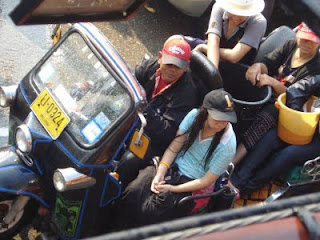But then there are also those moment – perhaps strolling into one of the hundred glittering Wats around Chiang Mai, when I am almost bulled over by that realization that I am living in the same country where a musically inclined teacher sang frustrations at a king. That favorite childhood musical seems both very close and very far away from my life in the north.
At times it feels dream like, other-wordly. I half believe I will wake up and be back in my bunked bed in a gothic dorm with sleet pounding the windows. But at the same time snow and gargoyles seem so distant both mentally and physically from the present that I might as well believe that I am a cat and have had multiple separate lives, and to which this life has known neither. Even cheese, that amazing invention that I once inhaled three times a day and more, and thought I could never live without, has slipped into intangible memories only.
Somewhere in between driving miles on dusty late night highways out into the countryside, where the roads swoon unexpectedly to the right and to the left, and parading in front of a multitude of chalkboards, I have forgotten what it is like to be anywhere else. I have grown trepidatious about returning to America, as it no longer feels like I will be returning, but instead arriving for the first time.
Some might look on this year as a blip, almost as a semester abroad, a break from normal life. Its not. Chiang Mai is life like anywhere else. Sure we might have palm trees, golden temples, orange clad monks in long procession. But we also have work, we have our rainy days, our broken bikes. And when I say it is life I mean that it is also the place I call home.
But here we are in April, at the start of another Thai year. Outside children, women, old men have been dousing cars with water drawn from the moat around the old city. It is hot, a tad muggy, sometimes you can hear the chants of monks, the cackles of roosters. There are waves of smoke laced with chili oil that make any passer by bend over hacking. Today I will go to the morning market. I will buy bags of bamboo shoots – spicy, and leaf bundles of sticky rice and egg custard. This afternoon I will get on a plane and start the day plus journey back to a country I have called home for twenty-two years of my life. But I will also be leaving home. Coming and going. Going and coming.
I have been internally fortunate to find such great friends, such a supportive community, and blessed with so many hilarious, moving, striking moments. It is near impossible to pack up, to sell my bike, to lock my apartment door, to give last rounds of hugs. It is only possible because I know I will be back. It is that simple I will need to come home, and I will need to come home soon.
Sawadee bee mai!




